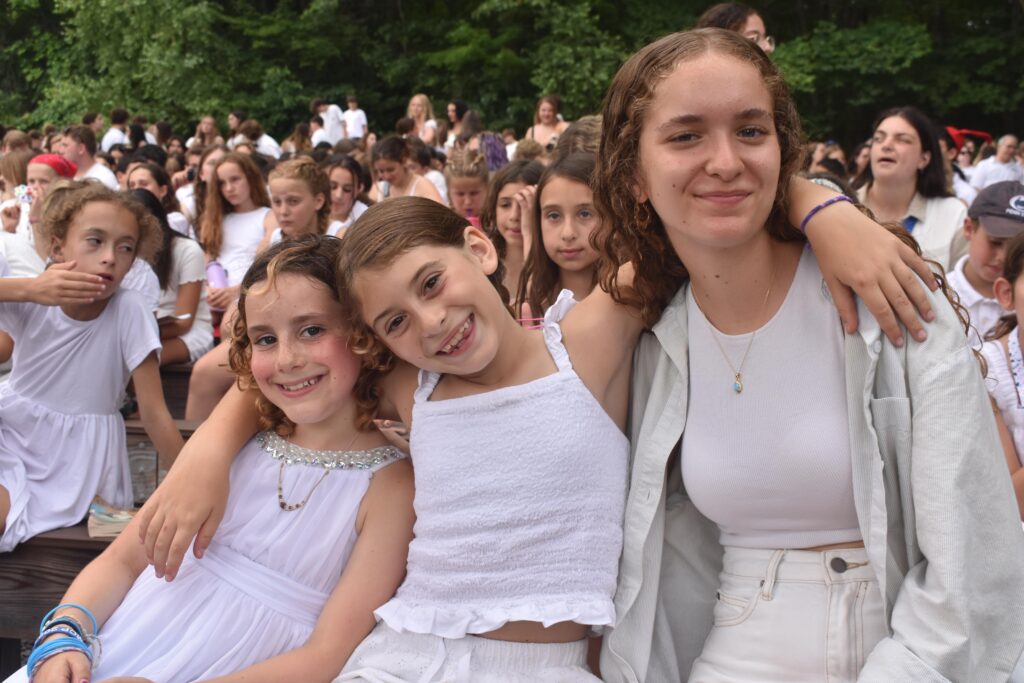
Thinking about Others
Shabbat Readings and Remarks from Chavurah and Carmel Campers and Assistant Director Aaron Solomon – July 14th and 15th
Carmel’s Friday Night Service
Elliot, Brandon
Brandon: Shabbat Shalom. This week’s middah is Acharayut, thinking
about others. One example is helping someone when they are sad. One time that someone helped me is when someone gave me a piece of candy when I was sad, and that made me feel good.
Elliot: It is a good idea to think about others because they will pay you back. Think about a trampoline in a bag. If you put something in it will bounce back to you. This is like Acharayut.
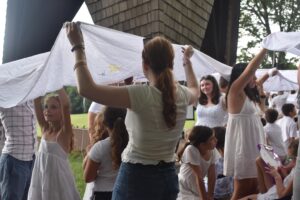
Brandon: We hope our Carmel service helps us all learn new ways to think about others, from helping someone, to giving someone a toy, or cheering them up.
Elliot: These are all examples of Acharayut.
Together: Shabbat Shalom!
Dani, Zoe, Dalia
All: This prayer is the Hashkiveinu. It’s about peace, shelter, and comfort.
Dalia: I thought about others when my friend was sad so I comforted her.
Zoe: I have peace when I’m with my dog and my brother Levi.
Dani: I thought about others when it was raining and someone needed shelter, so she came into the Lodge and I welcomed her.
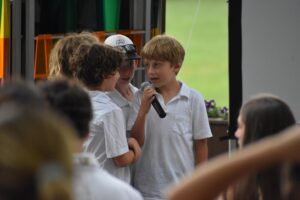
Zoe: I found comfort when on Shabbat I was feeling homesick and my friend helped me.
Dani: I find peace doing gymnastics.
Dalia: When my friend came to camp late I made her feel at home.
All: All three of us find peace when we sing the Hashkiveinu.
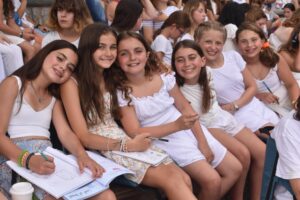
Avi, Ruth, Adele
Ruth: A time I thought about others was on the first day of camp- I was feeling lonely but then I saw another kid that was also feeling lonely. So I walked over and started a conversation with them.
Avi: A time I thought about others was at adventure and a another kid really wanted to go on the wall but we were running out of time so I let them go in front of me.
Adele: As you can see it is important to remember to always think about others, please take a moment for silent prayer.
Kaden, Marva
Ma’ariv Aravim is about night time. I go to bed in the evening and the next thing I know, it’s morning time.
My counselors show Acharayut and think about me by always waking me up in the morning, even though I am usually the last one to get up.
I really appreciate that they think about me.
This encourages me to think about my bunkmates and help them brush their teeth, make their bed, and get on the porch so we can walk to breakfast.
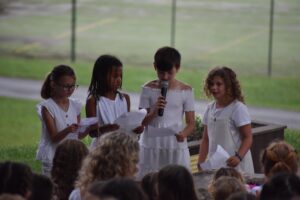
Mark, Luke
Luke: Our friend left a few days ago after snack. We were all very sad, but we were listening to everyone and we were cheering everyone up.
Mark: Shema Yisrael. Just like the Shema everyone was listening to each other like the Jews were listening to God.
Luke: When our dear friend was here, we all had so much fun, maybe a bit too much fun…
Mark: Our friend, let us choose what we wanted to do for camper free choice and he joined. Then we let our friend choose what he wanted to do for the next camper free choice and we joined him.
Luke: We are so glad we let him choose because that was his last chance before leaving.
Ezra, Hannah, Brooke
Hannah: The Barchu is about getting ready to pray together.
Brooke: When someone is sad I brighten their days by sharing my items.
Ezra: To be thinking about others means coming together, old friends and new friends.
Hannah: To me, thinking about others means giving a helping hand to someone even if you don’t know them.
Ezra: Thinking about others can just be something little like holding someones hand or just a smile.
Brooke: This is my first year at camp. Knowing I had to be here for a while I was sad at first but then my friends helped me a lot and now I got used to camp.
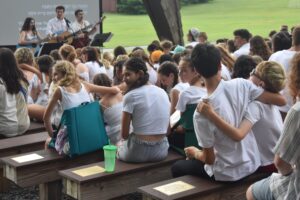
Amielle
At camp we are learning different middot, which are ways to make yourself a better person. The midday we are learning this week is Acharayut – thinking about others.
One time I used Acharayut- thinking about others, was when I let my friend, in my bunk, borrow my hairbrush, because they lost theirs. One time a friend helped me, was when my bunk mate let me borrow a bathing suit, because I didn’t have any dry ones.
Other ways we show Acharayut at camp are: passing and stacking, nikayon, cheering-up friends, comforting others, and listening to each other by showing Acharayut, we became a better community.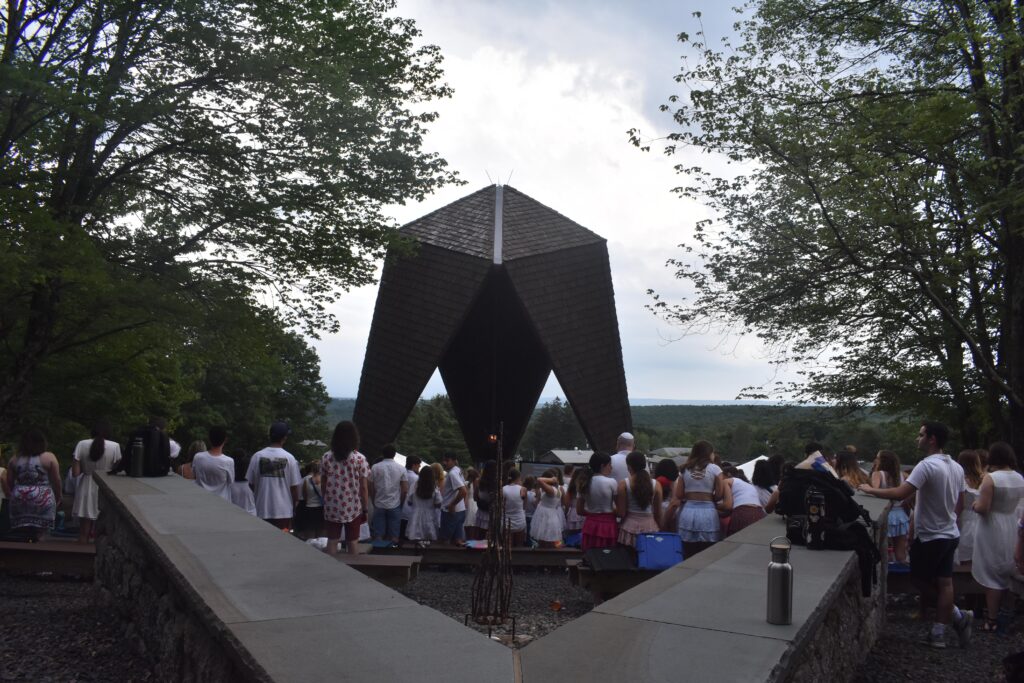
D’Var Torah from Aaron , Assistant Director
Binah – seeking meaning.
I am not good at seeking meaning. I am not good at stopping to take a break and observe what is happening around me. Like many of our campers, I am good at being on the move. I am good at packing my days with soccer and shabbat sha-ball, check-ins with counselors, firm handshakes with campers, frisbee tosses, and peanut butter jelly uncrustable sandwiches.
There’s so much to do in a day of camp that it’s hard to think about what you’re actually doing. We speed through activities, eagerly anticipating the next chance to climb the Tower, the next Brown or Green Time, the next time we’ll jump in the pool with our friends. Well, for everyone who, like me, has been speeding through summer, I have some bad news: we are now entering the last 24 hours of First Session 2023.
During these last hours together, I encourage everyone to slow down. The time we have together here is short but meaningful. Cherish the last hugs with your bunkmates, villagemates, and counselors. Tell your friends you love them and take the time to thank each other for another magical summer. Time at Camp Harlam is full of meaningful moments, and I promise to stop and seek them out with you in these final hours of first session. I hope you’ll all slow down time with me.
Shabbat Shalom Camp Harlam.
Chavurah Saturday Morning Service
Mila, Max, Sofia, Orlick, Evie
Mila: The music we hear at camp is special to each and every one of us. It gives camp a deeper meaning than we would ever be able to find without.
Evie: When you listen to songs like Summertime Forever and Stars in the Sky, you are magically transformed back to the amazing memories of screaming your heart out on the last Saturday night.
Sofia: Music carries memories with each note and lyric. Whether it’s singing with friends on the long walk to and from the village..
Max: Banging on the tables each Friday night, screaming Hallelujah with our whole unit…
Orlick: Waking up with all of my bunk mates to Rattlin’ Bog…
Mila: Coordinating up down up down during Gevurot with friends and anticipating the annual Ein Ode.
Evie: Or swaying around the fire singing Down with the Shine and Rivers and Roads, finally understanding the truth in these lyrics and knowing we may never sing these songs all together again.
Sofia: When I’m listening to music that is meaningful to me, and someone runs over, expressing their excitement at hearing a song that they had once believed no one else liked, it connects us in ways simple conversation never could. For me, music at camp is more than just a melody; it is friendship.
Max: Each and every Friday night, the entirety of Harlam comes together as one voice. Song session amplifies this voice and allows us to fully view the family we have here at camp. For me, music at camp is more than just a melody; it’s a community.
Orlick: When my eyes open each morning to the first ear-shattering note of the surprise wake up song that is randomly selected by the shuffle of a morning playlist, I’m instantly filled with a sense of readiness for a new day. For me music at camp is more than just a melody; it is excitement.
Evie: Sitting around a campfire with the people that I love most, learning the songs that the generations of Chavurah campers before me cherished so dearly brings the memories of the people who once stood, walked and slept right where we have come
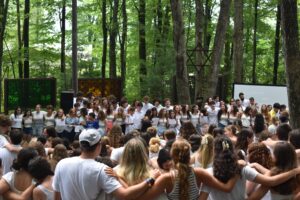
back to life. For me, music at camp is more than just a melody; it is upholding traditions.
Mila: After 8 years of camp, I have come to appreciate the ever-changing tunes of Shabbat prayers. The joyful surprise of hearing a version of a prayer that I remember from Carmel and Sharon never fails to bring me childlike excitement. For me, music at camp is more than just a melody; it is nostalgia.
Max: As we have spoken about the music that gives camp a deeper meaning to each of us, we encourage you to seek the meaning of the music we hear at camp starting with Mi Chamocha.
Andrew
Hebrew School wasn’t my favorite. I always tried my best but I never truly connected with it so I eventually gave up. Along with this I was struggling with my disabilities. I would ask myself “why am I different?”, “why do I have to go through all this pain while others live a normal life?” Religion played a part in this questioning and I thought to myself “if God is real why would he make me this way?” So when I came to this camp I wasn’t too pleased to hear about the Friday night shabbat services or the prayers at lunch. But over these few weeks I have learned years of knowledge. Being Jewish is not all centered around you…it’s more. It’s about community and learning to be good human beings. Here at camp I found a community that accepts me for all I am and I have reconnected with Judaism. Putting God aside, Judaism has still taught me many life lessons. going back to seeking meaning. I found that I’m still learning about my connection to Judaism and myself, but Camp Harlam has gotten me on the right path and I’m learning to accept myself with all of my quirks and disabilities.
Julie
As my time as a camper sadly comes to an end, I have definitely learned how to seek meaning at camp. With all of the special things at camp including song sessions, color war, services and just the daily programs, I have learned that everything happens for a reason and you just have to really pay attention to your surroundings at camp.
Jessica
Even though I’ve only been at camp for 2 years I found meaning from being here. Camp has become a big part of my life. It has positively impacted me and made me become a better version of myself. The campers and counselors are so nice. They make me feel like I belong. I love dancing with my friends at water Zumba and singing Siyyum L’Yom with everyone by the fire. I was able to find Bina from my time as a camper by surrounding myself with good people who build me up instead of break me down.
Aaron
As my time draws to a close as a camper here at camp I have started down the long and Winding Road of a new chapter of my life. I have thought about what camp means to me and it’s legacy on me. My answer to the question I poised my response and answer is that what camp means to me is that camp has become a part of me along with the legacy camp has left on me. It is so profound in many ways. I can only say that as I read this here today I still haven’t found what I am looking for to describe it. So as my time as a camper is quickly fleeting I keep thinking of a Scottish phrase usually said around New Year’s to celebrate The Melancholy of a year passing and to the joyful start of a new one. The phrase literally translates to something meaning “around times since past.” So I leave you with it with a tear in my eye that the next time I see this place again after today I will no longer be a camper but as something different, maybe better, but different. So I leave off here and finally say the phrase that has been echoing in my head this entire session, I take a bow and for one final time I utter these words For Auld Lang Syne.
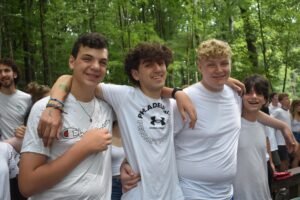
Maddie, Sofia, Sasha, Hannah
Maddie: Our Middah is bina, which means seeking wisdom. As the oldest unit at camp our job is to set an example for the younger units, and help them to gain knowledge like we have in past years.
Sofia: Over the years at camp we have received wisdom from our Chavurah buddies in Carmel to teaching our Carmel buddies and Chavurah.
Sasha: However, part of being wise is knowing you can always learn more. Like how to survive the hike from Main Camp to the village, how to budget in New York, or even how to climb the tower.
Hannah: We’ve gained so much wisdom from being in Chavurah and now we can shed that light on to you during this last weekend of the session. Just remember to cherish the time you have while at camp because time really does move fast.
Abby, Lexi, Penelope, Tali, Elyssa
Tali: As we close out our last Shabbat as campers, we’ve come to realize the little things about camp are what brings us back summer after summer.
Lexi: Although we’ve all had different experiences here we can all agree that the little things bring out the beauty of camp.
Elyssa: Whether it’s the signatures in the bunks or the unit sitting around the fire every night for Siyyum, we can appreciate how these moments have brought us together.
Penelope: Things like the hand motions during the Birkat highlight the unique Jewish Community camp provides.
Abby: Our time as campers has flown by but will always remember the memories made, the friendships formed, and the place we can all call home. Don’t overlook the little things…
All: it’s what makes camp, camp!
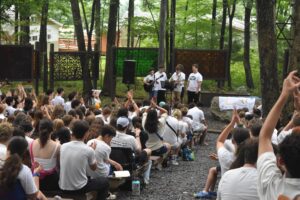
Cole, Davis, Asher, Benny
This may be your last year as campers but it’s not the end.
Next year we plan on going on the Israel trip to continue our time together.
It’s hard for us to say goodbye and to look ahead at the new Journey that awaits us.
Throughout our experience here we have made so many connections with amazing people.
We will continue to do this with the lessons that camp Harlam taught us.
Camp Harlam is our home and it will never be harder to leave it all behind.
Nate, Noah, Eli
All: Shabbat Shalom
Nate: Today is a very special day.
Eli: Not because there are birthdays.
Noah: Or because someone climbed the tower.
Nate: But because today is our last day here as campers.
Eli: While I have only been here for 5 years
Nate and Noah: us 7
Eli: Our memories made here will last a lifetime.
Noah: Something we realized in our time as campers is that we can seek meaning in every moment.
Nate: Remember to take a step back, see camp in a new perspective and see why we call this place home.
Eli: Because before you know it you will drive through the gates for the last time.
Nate: Remember to do the camp play
Noah: Talk to a new person
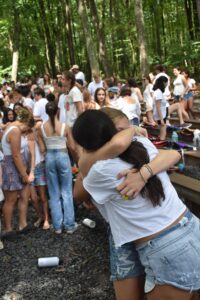
Eli: Or jump in that refreshing pool.
Nate: Whatever it is for you
Noah: Go for it, enjoy it, live for it, and remember to seek meaning
Eli: Because before you know it
Nate: You will be in our position
All: Saying goodbye for the last time.
Mimi, Elana, Jesse, Evan
Evan: When I was younger, I did not enjoy Shabbat but as I’ve grown up I have grown to love it. nothing about Shabbat changed except for the way I looked at it. I used to dread coming to sit on these benches for an hour and a half but now I look forward to this time where I sing and bond with my friends.
Jesse: When I was younger, I did not look forward to going to camp at all. I felt homesick a lot and knew that I’d miss my family. Now I can’t wait to go to camp and see some of the best friends that I’ve made throughout the years.
Mimi: Last Saturday at dinner my fortune cookie said, ” Life is a mirror. If you frown at life it’ll frown back. But if you smile, life will do the same. ” At camp it can be very easy to frown, but something we’ve realized is that we can choose how we look at things.
Elana: So much happens every day, and when we look back at all of our summers at camp, we remember the good things. We don’t think about the nights we spent homesick, we think about the nights we spent dancing on the porch with friends. The nights we spent singing our hearts out at song session. The nights we spent with our arms around each other singing Siyyum L’yom.
Mimi: Just like my fortune said, camp is a mirror, and when we look back at our summers at Harlam we smile.
Evan: Smile with us now as we think about the joys of Shabbat at camp as we sing Yismechu.
Samantha, Samara, Sofia, Lucy, Rebecca
Becca: Dear camp Harlam,
All: Thank you.
Becca: Thank you for bringing me to the friends I call sisters in the place that I call home. Through thick and thin, laughter and pain, falling out of a water raft and at my lowest points, they have been with me by my side and helped me through it all. Even though I just met them last year I feel like I’ve known them forever.
Sofia: Thank you for the memories I have made. For the laughs, hugs, and the opportunity to call these girls family. Camp is not about the food, the bunks, the water pressure or climbing to the top of the tower. It’s about the memories we make and the people we make them with. I will hold these memories in my heart forever.
Lucy: Thank you for helping me become the person who I am today. The programs, the services, the memories, and the people have shaped me into the strong independent and outgoing person I am today. Each summer I came out with more memories, friends and most importantly I came out a better person. This is all because of Camp Harlam, the place I call my second home.
Samantha: Thank you for allowing me to connect to my Judaism through songs and prayers. Through my time here at camp, I have been able to create a new and personal song. A song about friends, a song about memories, a song about what it truly means to be Jewish. Whether it’s banging on tables, screaming Hebrew, or even spraining my ankle at song session, camp has allowed me to understand and appreciate my religion. After 7 years at Camp Harlam I have been able to find what Judaism means to me. This. This space, this air, these people and the peace and joy I feel every year when I drive through the gates. The memories I have made here will be with me forever.
Samara: Thank you for giving meaning to the phrase “home away from home.” Although my physical home is an hour and 45 minutes away, this place is where I truly feel at home. 8 years ago I had no idea how lucky I would become. Now, in Chavurah, looking back, I now can say I have connected with so many different people in so many different ways. This camp gives me security, charm, and most importantly memories. Without Camp Harlam the words “home away from home” would mean nothing to me.
All: Love, the happiest campers!
Samara: As we pray silently we invite you to reflect on the ways you can seek meaning throughout your time at Camp Harlam.
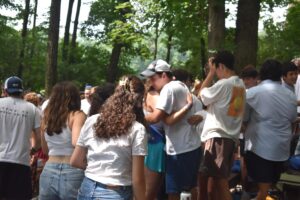
Shabbat Sha-raps
Saturday Morning and the peeps are here. It’s time for shabbat let me get a cheer. We will talk about Moses, Aaron, the Levites too. AYOO Jamie, you know what to do.
Yo, listen up, I’m ’bout to drop some knowledge so divine,
It’s the Parshah rap, gonna break it down line by line.
First up, we got “Matot,” it means “Tribes” in Hebrew,
Found in Numbers 30:2, let me give you a preview.
Moses steps up, conveying laws about vows,
To the heads of Israel’s tribes, he bestows.
Then war breaks out, against Midian they fight,
for plotting the destruction, they’re in the wrong and not right.
The spoils of war, the Torah does reveal,
How they were distributed, it’s a big deal.
Among the people, warriors, Levites, and the high priest,
Everyone gets their share, the war has ceased.
Matot and Masei, these Parshahs are fire,
Burning with wisdom, let your spirits go higher.
From journeys to laws, it’s a tale so grand,
Come on, everybody, let’s rock to the Promised Land.
Now let’s talk about “Masei,” meaning “Journeys” so clear,
Found in Numbers 33:1, pay attention, my dear.
Forty-two journeys and encampments they made,
From the Exodus till Moab, where they finally stayed.
Boundaries of the Promised Land are made known,
Designated cities of refuge, where a killer can atone.
The tribes of Reuben and Gad, with Manasseh’s half,
wanted lands east of Jordan, a cattle-pasture calf.
Moses was angry at their request at first,
But agreed on a condition, their loyalty to thirst.
They must lead the conquest, show their true might,
In Israel’s journey, fighting for what’s right.
Lastly, the daughters of Tzelafchad, they made a move,
Married within their tribe, their inheritance to improve.
Their father’s estate stays within Manasseh’s fold,
No other tribe will take what their lineage holds.
So there you have it, the Parshahs in a rap,
Matot and Masei, drop knowledge in your lap.
From laws to battles, and journeys so vast,
The Torah’s lessons, they will forever last.
